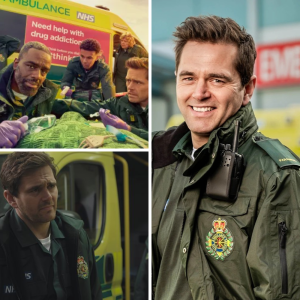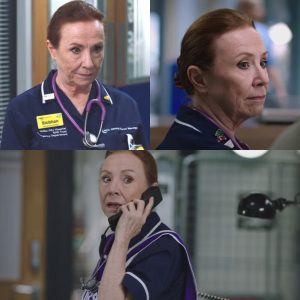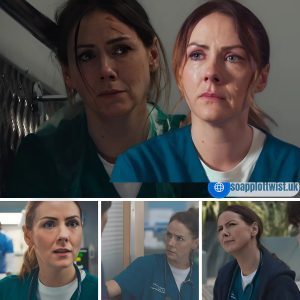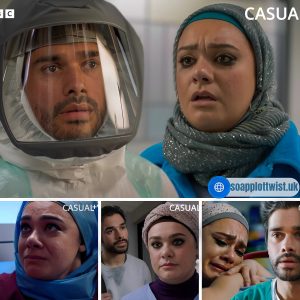The long-running BBC medical drama Casualty consistently distinguishes itself by plunging viewers into the ethically complex and emotionally charged realities of emergency medicine. A recent pivotal episode, “Choosing His Staff Over His Family,” meticulously explored the profound moral quandaries faced by healthcare professionals, igniting widespread debate among its dedicated fanbase regarding the boundaries of loyalty, the price of professional duty, and the deeply personal sacrifices demanded by a high-stakes career. This compelling narrative centered on a senior consultant pushed to an agonizing breaking point, forced to choose between offering critical support to his overwhelmed staff or immediately attending to a severe personal family crisis. The episode masterfully delivered a gripping, visceral blend of human vulnerability and intense workplace politics.
At the heart of this dramatic unfolding was Dr. Patrick Owens, a figure of immense respect and unwavering dedication within Holby City’s Emergency Department. Renowned for his tireless commitment to the hospital, often extending beyond the call of duty, and his fiercely protective nature toward his colleagues, Patrick has always navigated the precarious tightrope between being an authoritative leader and a compassionate friend. However, the narrative thrust him into an unprecedented ordeal when an escalating crisis at home collided head-on with an already tumultuous situation within the ED. This confluence of events presented him with a profoundly painful crossroads – a decision that carried the weight of potentially irreversible consequences for both his professional standing and his fractured personal life.
The episode opens with an immediate jolt, as Patrick receives an urgent, unsettling call from his teenage daughter’s school. She has been involved in a serious incident, one that his ex-wife’s distressed voice over the phone makes clear could have profound emotional implications. Her desperate plea for him to come immediately underscores the family crisis. Yet, at that very moment, the Holby ED is spiraling into a maelstrom of chaos. A devastating multi-vehicle accident has inundated the department with a sudden influx of critically injured patients, stretching already thin resources to breaking point. The heightened pressure amplifies pre-existing tensions among the fatigued and overwhelmed staff.

Adding another layer of complexity to Patrick’s dilemma is the plight of his trusted second-in-command, nurse leader Leah Jordan. She epitomizes the pervasive burnout afflicting many healthcare workers, battling extreme exhaustion after a relentless string of multiple double shifts. Her physical and mental fatigue has pushed her dangerously close to making a critical medical error. Witnessing Leah on the verge of collapse immediately triggers Patrick’s deep-seated protective instincts and his unwavering sense of responsibility to his team. Every fiber of his being urges him to stay, to stabilize the department, and to safeguard his staff. But the clock is relentlessly ticking, and his distressed daughter, desperately waiting for him, looms large in his mind.
In the cutthroat, high-stakes world of emergency medicine, leaders are perpetually forced to make instantaneous, often gut-wrenching decisions, prioritizing the immediate needs of patients and the collective well-being of the department over any personal considerations. Patrick’s long-standing mentor’s adage, “Patients come first — always,” has served as the unyielding mantra he has lived by for decades, shaping his professional identity. But on this particularly harrowing night, the traditionally clear line between moral professional duty and his profound emotional responsibility as a father irrevocably blurs, challenging the very foundation of his belief system.
As the ED plunges further into a state of controlled chaos, Patrick decisively steps in, demonstrating his innate leadership. He takes swift command, expertly overseeing triage, directing critical cases, and crucially, supporting Leah through her breaking point, preventing a catastrophic error. Each minute he dedicates to the crisis in the ED, however, only serves to amplify the urgency of his daughter’s situation. The gravity of his choice extends far beyond merely missing a family moment; it reinforces a devastating perception for his family—that his demanding job will consistently outrank his fundamental role as a father. His ex-wife’s voice over the phone—laced with palpable disappointment, weary resignation, and a profound sense of abandonment—is portrayed as a visceral gut punch. The tension is palpable in every clipped sentence and extended, agonizing pause, echoing the silent scream of a family unit fracturing under the weight of professional demands.
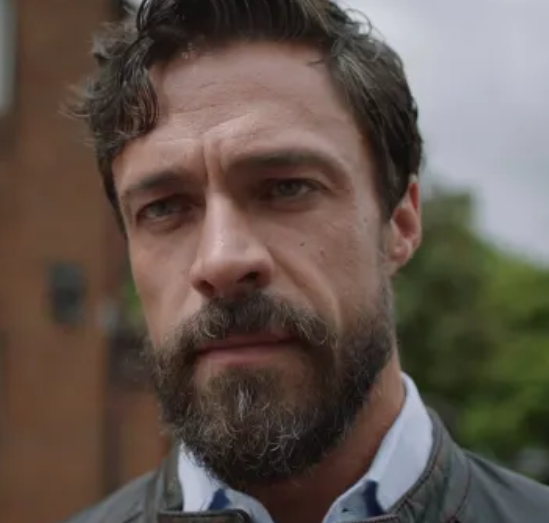
The episode’s writers skillfully weave in intricate subplots that deepen the layers of Patrick’s already agonizing dilemma, painting a holistic picture of the ED’s collective strain. Paramedic Iain Dean finds himself locked in a tense clash with junior doctor Rash Masum over the immediate treatment of a young crash victim. Their disagreement starkly reflects the immense pressure on the ED staff as resources stretch perilously thin. Elsewhere, Dr. Emily Carter, a new locum doctor, struggles desperately to integrate with the established team. Her visible struggles further heighten the pressure on Patrick to remain, to manage complex team dynamics, and to prevent any additional instability in an already volatile environment. Adding poignant historical context, the episode cleverly employs flashbacks to earlier moments in Patrick’s career when he did choose family over work, revealing the harsh professional fallout he endured. This rich history provides crucial insight into why the character is so intensely reluctant to walk away now, even when his own heart and paternal instincts are screaming at him to leave.
As the narrative hurtles towards its gut-wrenching climax, Patrick is confronted with an emotional breaking point that tests the very core of his being. His daughter, desperate, sends him a heartbreaking voice message, her young voice trembling, simply stating she “just needed her dad today.” Simultaneously, the escalating crisis in the ED culminates as Leah, succumbing to sheer exhaustion, tragically collapses in the middle of a critical surgical procedure. This catastrophic event demands Patrick’s immediate, decisive intervention to save both Leah’s life and the patient’s. In that pivotal, heart-stopping moment, faced with the collapse of his colleague and the desperate plea of his child, Patrick makes his choice: he chooses to stay.
His decision, while met with a profound sense of relief and quiet gratitude from his beleaguered team, is met with utter devastation from his family. By the time he finally arrives at his ex-wife’s house, hours later, the critical moment has irrevocably passed, the opportunity for comfort and connection lost. His daughter, heartbroken, refuses to speak to him. The episode concludes with a profoundly poignant image: Patrick sitting alone in his car, parked outside his estranged family’s home, the crushing weight of his impossible choice settling in around him like an oppressive, inescapable storm cloud, leaving him to confront the profound isolation of his dedication.
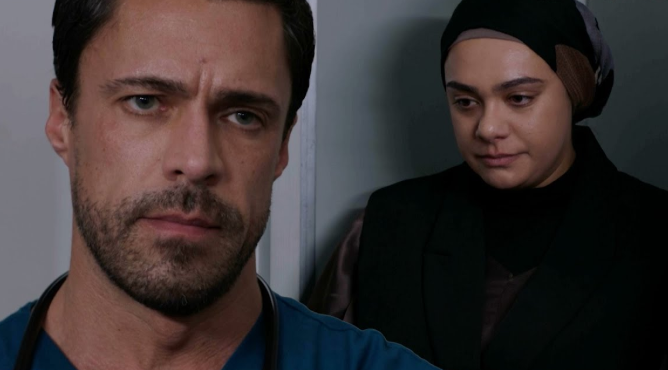
Following the broadcast, social media platforms erupted with a torrent of reactions, with Casualty fans sharply split down the middle, passionately defending or condemning Patrick’s actions. Some viewers showered Patrick with praise for his unwavering dedication, labeling his choice “heroic” and an embodiment of his “true oath as a doctor.” Others criticized, arguing he could have delegated responsibilities, asserting that missing such a critical moment in his daughter’s life constituted a devastating personal failure. One poignant viewer comment: “It’s easy to say ‘patients come first’ until it’s your own child who needs you.” Another countered: “If Patrick had walked away, lives could have been lost. His daughter may never understand that, but it’s the hard reality of his job.”
The enduring power of this episode lies in its masterful ability to tap into a universal struggle: the perpetually elusive balance between demanding professional obligations and deeply cherished family commitments. For professionals entrenched in high-pressure careers, particularly within healthcare, choices are rarely clear-cut, often presenting as agonizing dilemmas with no truly “right” answer. The writers deliberately avoid painting Patrick as a simplistic hero or villain; instead, they portray him with empathetic nuance as a complex human being, navigating truly impossible circumstances with genuine intent and profound personal cost. This narrative serves as a powerful, sobering reminder that leadership, particularly in critical fields, is not merely about making the optimal decision for the team; it is profoundly about living with the often-devastating personal consequences of those decisions. Patrick’s fictional situation, while dramatized, mirrors the very real emotional toll, moral injuries, and profound personal sacrifices faced daily by countless healthcare workers around the world, making this episode a poignant and timely reflection of their unseen struggles.
